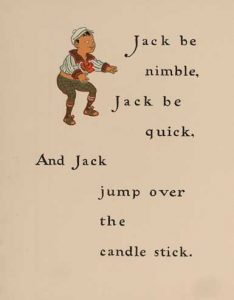
Learning rhymes can be so beneficial for early development. Experts in child development have discovered that children who learn rhymes at an early age become excellent readers, writers and spellers. Rhymes are great for kids to learn phonics, volume, pitch, use their imagination, follow sequence, patterns and so much more. It’s a method to educate young children. Many young children love to enjoy lot’s of fun when they are engaging in reading or listening to rhymes.
FUNNY NURSERY RHYMES
Children love funny stories and rhymes, which can make the learning experience even better. They tend to laugh, sing along, smile and appreciate the sounds that make them chuckle. Here are a few:
Jack be nimble,
Jack be quick.
And Jack jump over the candle stick.
Humpty Dumpty sat on a wall,
Humpty Dumpty had a great fall
All the King’s horses couldn’t put
Humpty together again
ABOUT RHYMING
Rhyming is one of the reasons why children’s English vocabulary skills improve. It’s a way to win their attention. It’s a way to create magic within their imagination. They develop essential language skills, which enhance early reading and listening skills.
Every rhyme is a story or poetic expression that children can act out, sing along, or read. Some of them can be the funniest ever! Many picture books show depictions of a rhyming story, which can illustrate laughable scenes.
Rhymes provide perfect practice with early reading. They can also be good for reinforcing rhymes and your can create activities or ideas to recite them. It’s a super fun way for children to get to know one another during early school years.
THE BENEFITS OF RHYMES
The incredible learning benefits of rhymes are astounding. It’s an easy form of poetry and song that help promote language, social skills, vocabulary format, repetition, cognitive skills, physical skills and motor skills. As children grow, they start to remember rhymes. If they keep repeating the words, they begin to enjoy the sounds, which help develop memory. Rhymes help children start to store words and tunes. When children experiment with words and sounds, it helps them improve with language development. If they practice rhymes with a group, it becomes fun and they physically become involved by using their hands, legs, or body movement. Learning to enjoy rhymes from age 2 and beyond, helps a child to appreciate the joys of reading. These skills set the tone for their future. It’s a solution for early learning and development. It’s an extraordinary way to expand their imagination and how the English language can be creatively used. Rhymes for young children are great tools that resonate for early learning and social skills!